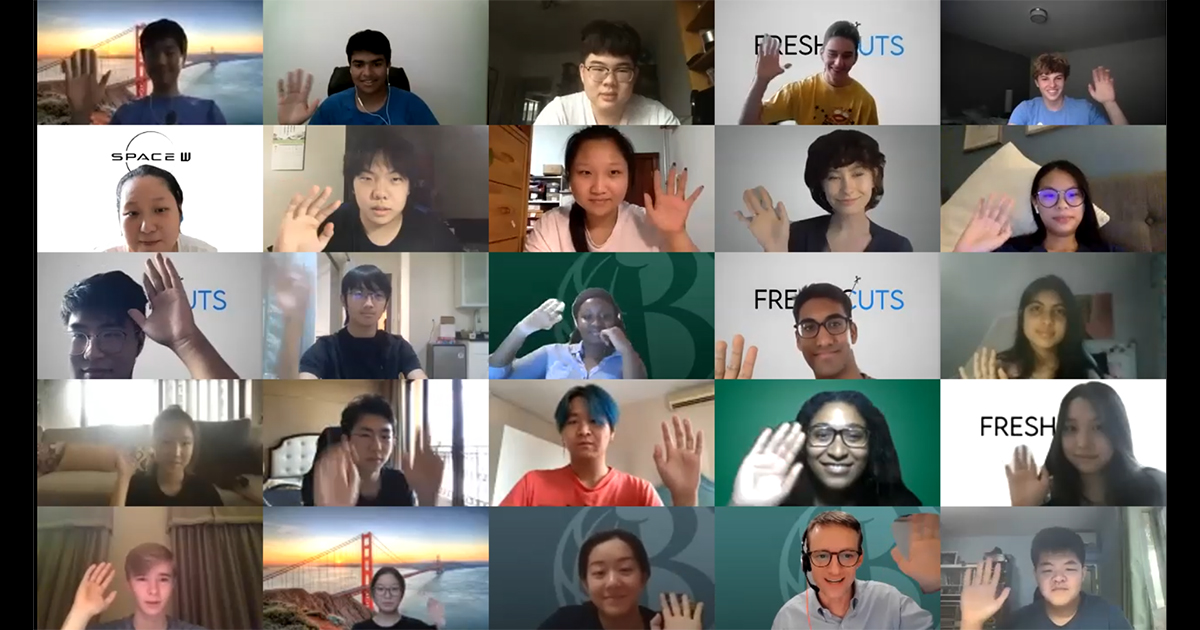Summer Study Success Creates Long-Lasting Impact

For the past decade, the Lewis Institute has replicated the Babson experience with its Summer Study for High School Students program, helping rising juniors and seniors develop as entrepreneurial leaders in a month-long residential program.
This year, though, the program underwent drastic changes to transition online because of the COVID-19 pandemic, but it produced dramatic results that could impact the Babson experience itself.
A record 148 high school students from 21 countries completed this year’s revised Summer Study. Although they attended online rather than on campus, the budding entrepreneurial leaders still learned the core tenets of the Introduction to the Entrepreneurial Experience course—albeit in a revamped format under unique circumstances.
The experience, though, provided a glimpse of the future of online learning for both students and faculty.
“I believe it is a preview of what higher education might look like,” said Associate Professor of Management Jonathan Sims, the Summer Study faculty director.
Rising to the Occasion
When the pandemic hit, there was real concern about whether it was even feasible to provide Summer Study online—and whether enough students would be interested.
Joe McNamara ’16—who has been instrumental in Summer Study the past five years in his role as manager of innovation and growth with the Lewis Institute’s Babson Youth Impact Lab—says they were hoping to enroll 40 students. Instead, the program enrolled nearly four times that number.
“We were shocked,” McNamara said. “We were excited there was that much interest, but we weren’t sure what it would look like and how we were going to do this. The faculty rose to the occasion.”
It wasn’t as simple as moving a single course online but involved rethinking the entire approach while meeting the same academic objectives, including creating and working on venture projects, similar to Foundations of Management and Entrepreneurship. Led by Sims, the faculty—including, Professor Phillip Kim, Assistant Professor Kerry Gibson, Assistant Professor Siddharth (Sid) Vedula, and Visiting Assistant Professor and Lewis Institute Fellow Lucy McAllister—re-envisioned every aspect of the Summer Study program to deliver it online to such a big cohort. The Lewis Institute, including Executive Director Cheryl Yaffe Kiser and Youth Impact Lab Director Risa Sherman, provided immeasurable support.
Connecting Students Around the World
For starters, the program was divided into two sessions to accommodate students scattered around the world—on six continents—across 11 time zones. So, the faculty produced a morning session from 9 a.m. to 1 p.m. EDT, then repeated the content in a night session from 8 p.m. to midnight.
Professors also had to find ways to use the technology to connect with students and help them connect with each other. They used online breakout rooms, polls, simulations, every tool at their disposal. Kim even designed a course on Entrepreneurial Thought & Action® using Arist—the text-messaging platform created by Ryan Laverty ’20 and Michael Ioffe ’21. And, they called upon an impressive list of Babson guest speakers, including: President Stephen Spinelli Jr. MBA’92, PhD; Vice President of Learner Success and Dean of Campus Life Lawrence P. Ward; and Associate Dean of Undergraduate Programs Wendy Murphy.
“They did an incredible job of taking the content that they’re experts at and delivering it in a way that I thought was just as, if not more, engaging than a traditional classroom,” Sims said of his colleagues. “These are exceptional professors, and they have different styles. And, it really worked.”
The faculty also relied greatly on student mentors—a group of 15 current Babson students who arrived at each online session an hour early and stayed an hour late. “The mentors were able to connect with these students in a way that faculty never could,” Sims said.
Embracing Online Experiences
The experience online was so successful that both Sims and McNamara say it could be offered again next summer, even if the residential program returns, or even in other time frames, such as the spring or on the weekend.
For now, the experience with Summer Study will have an immediate impact on the faculty and how they approach their classes this fall.
“I went from being very apprehensive and very anxious about teaching online to looking forward to it and enthusiastically embracing it,” Sims said. “In person has some distinct advantages, but there are a lot of things you can do online that are difficult to do in person. I think this gives us another incredible tool set that the faculty from the Summer Study program are much more comfortable with.”
Posted in Community




